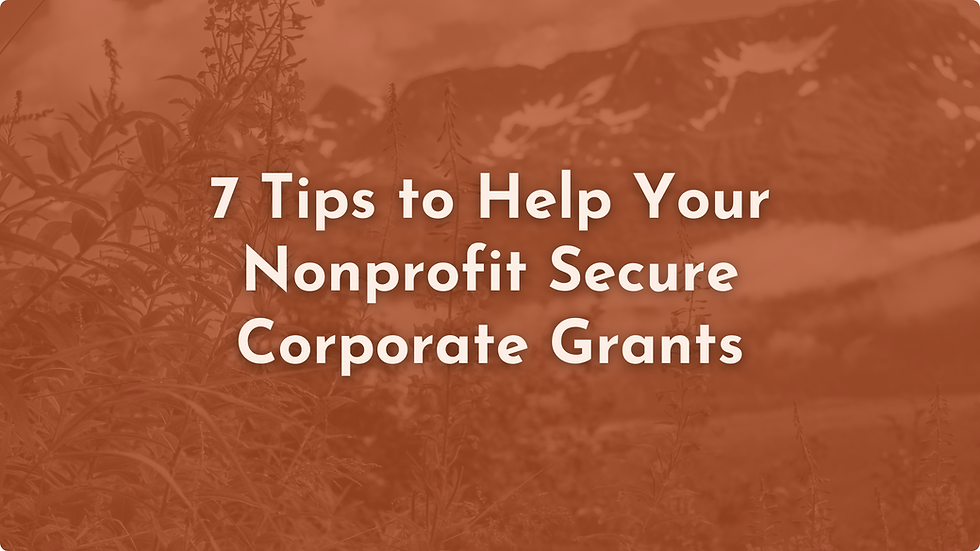- Jacquee Kurdas
- Sep 15, 2025
- 2 min read
Updated: Dec 15, 2025

If you’re like many nonprofit leaders, corporate grants might feel intimidating, or like something “other” organizations do. But the truth is, corporate giving can be one of the most reliable and impactful funding sources for your nonprofit. And yes, it’s totally doable.
At Bloom Grant Consulting, here are seven tips I use to guide our clients to find and secure corporate support, without the overwhelm:
Know What You’re Looking For
Corporate giving comes in different shapes:
Direct grants: Companies fund specific programs or initiatives.
Employee-driven grants: These are often tied to volunteerism or matching gifts.
Sponsorships: Support for events or campaigns in exchange for visibility.
In-kind contributions: Donations of goods, services, or expertise.
Not every company offers every type. Knowing your options upfront helps you target your efforts where they’ll have the most impact.
Align With Their Values
Corporations have goals for giving—they want to support causes that reflect their mission and values. Do your homework:
Look at their CSR (corporate social responsibility) statements.
See who they’ve supported in the past.
Follow their news and community initiatives.
When your mission aligns with theirs, your proposal will naturally stand out.
Use Smart Tools to Identify Corporate Grants
Searching company websites one by one can feel endless. Corporate giving databases exist for a reason; they centralize all the info you need: eligibility, deadlines, focus areas, and more. A little upfront research can save hours and help you find the right fit faster. Look at websites such as Instrumentl, Double The Donation, or Candid's Foundation Directory.
Leverage Your Supporters
Your donors and volunteers might be the key to unlocking corporate grants. Many companies prefer supporting nonprofits that their employees already care about. Ask who works where, connect with employee champions, and let them help open doors. Warm introductions beat cold calls every time.

Tell Your Story With Numbers and Heart
Corporate funders want to see both impact and outcomes. Combine data with stories:
Show what success looks like.
Include measurable results.
Add personal testimonials that make your work real.
Tailoring your language to each company’s priorities makes it clear you understand them and their goals.
Show Up Online
Your website and social media are your first impression. Keep them professional, up to date, and full of proof points about your impact. A strong online presence reassures funders that you’re credible, organized, and making a difference.
Treat Grants as Relationships, Not Transactions
Winning a grant is just the start. Even if you don’t get the funding, every interaction is a chance to build connections. Send thank-you notes, share impact updates, invite company representatives to events, and stay in touch. Over time, these relationships grow into ongoing support.
Corporate grants can feel like a mystery, but in truth, they are a great opportunity for your organization. With thoughtful research, strategic alignment, and strong storytelling, your nonprofit can unlock new funding and build partnerships that last. It’s less about luck and more about strategy, relationships, and knowing your value.
At Bloom Grant Consulting, I love helping nonprofits feel confident and capable in this process. Contact us to learn more about how we can help your organization secure corporate grants.



